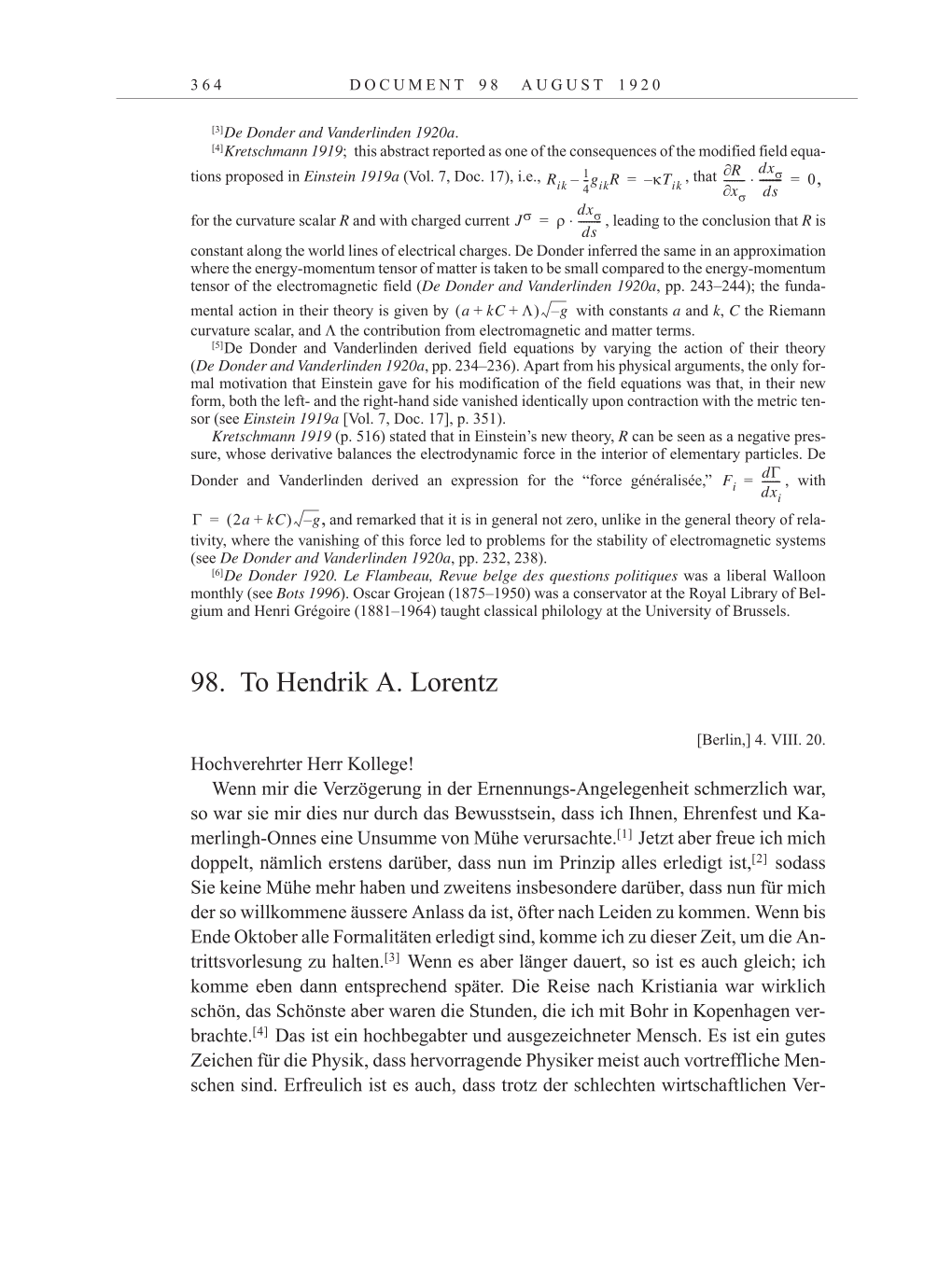3 6 4 D O C U M E N T 9 8 A U G U S T 1 9 2 0
[3]De Donder and Vanderlinden 1920a.
[4]Kretschmann 1919; this abstract reported as one of the consequences of the modified field equa-
tions proposed in Einstein 1919a (Vol. 7, Doc. 17), i.e., , that
for the curvature scalar R and with charged current , leading to the conclusion that R is
constant along the world lines of electrical charges. De Donder inferred the same in an approximation
where the energy-momentum tensor of matter is taken to be small compared to the energy-momentum
tensor of the electromagnetic field (De Donder and Vanderlinden 1920a, pp. 243–244); the funda-
mental action in their theory is given by with constants a and k, C the Riemann
curvature scalar, and the contribution from electromagnetic and matter terms.
[5]De Donder and Vanderlinden derived field equations by varying the action of their theory
(De Donder and Vanderlinden 1920a, pp. 234–236). Apart from his physical arguments, the only for-
mal motivation that Einstein gave for his modification of the field equations was that, in their new
form, both the left- and the right-hand side vanished identically upon contraction with the metric ten-
sor (see Einstein 1919a [Vol. 7, Doc. 17], p. 351).
Kretschmann 1919 (p. 516) stated that in Einstein’s new theory, R can be seen as a negative pres-
sure, whose derivative balances the electrodynamic force in the interior of elementary particles. De
Donder and Vanderlinden derived an expression for the “force généralisée,” , with
and remarked that it is in general not zero, unlike in the general theory of rela-
tivity, where the vanishing of this force led to problems for the stability of electromagnetic systems
(see De Donder and Vanderlinden 1920a, pp. 232, 238).
[6]De Donder 1920. Le Flambeau, Revue belge des questions politiques was a liberal Walloon
monthly (see Bots 1996). Oscar Grojean (1875–1950) was a conservator at the Royal Library of Bel-
gium and Henri Grégoire (1881–1964) taught classical philology at the University of Brussels.
98. To Hendrik A. Lorentz
[Berlin,] 4. VIII. 20.
Hochverehrter Herr Kollege!
Wenn mir die Verzögerung in der Ernennungs-Angelegenheit schmerzlich war,
so war sie mir dies nur durch das Bewusstsein, dass ich Ihnen, Ehrenfest und Ka-
merlingh-Onnes eine Unsumme von Mühe
verursachte.[1]
Jetzt aber freue ich mich
doppelt, nämlich erstens darüber, dass nun im Prinzip alles erledigt
ist,[2]
sodass
Sie keine Mühe mehr haben und zweitens insbesondere darüber, dass nun für mich
der so willkommene äussere Anlass da ist, öfter nach Leiden zu kommen. Wenn bis
Ende Oktober alle Formalitäten erledigt sind, komme ich zu dieser Zeit, um die An-
trittsvorlesung zu
halten.[3]
Wenn es aber länger dauert, so ist es auch gleich; ich
komme eben dann entsprechend später. Die Reise nach Kristiania war wirklich
schön, das Schönste aber waren die Stunden, die ich mit Bohr in Kopenhagen ver-
brachte.[4]
Das ist ein hochbegabter und ausgezeichneter Mensch. Es ist ein gutes
Zeichen für die Physik, dass hervorragende Physiker meist auch vortreffliche Men-
schen sind. Erfreulich ist es auch, dass trotz der schlechten wirtschaftlichen Ver-
Rik
1gikR
4
- - – Tik – =
R
x
--------
dx
ds
------ - 0,
=
J
dx
ds
-------- - =
a kC + + –g
Fi
d
dxi
------- =
2a kC +
–g,
=
